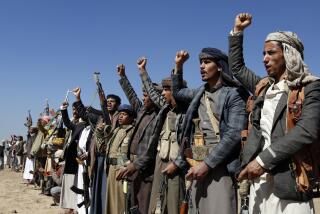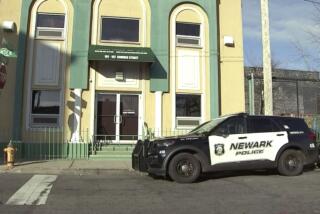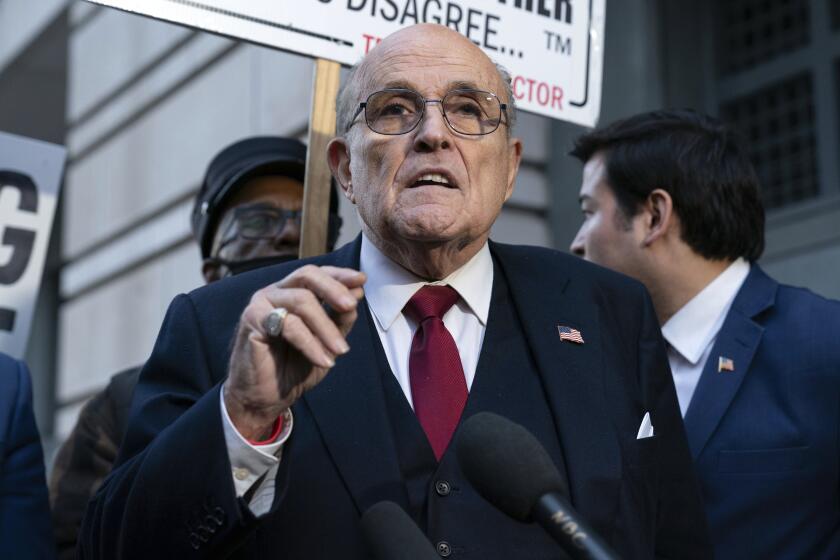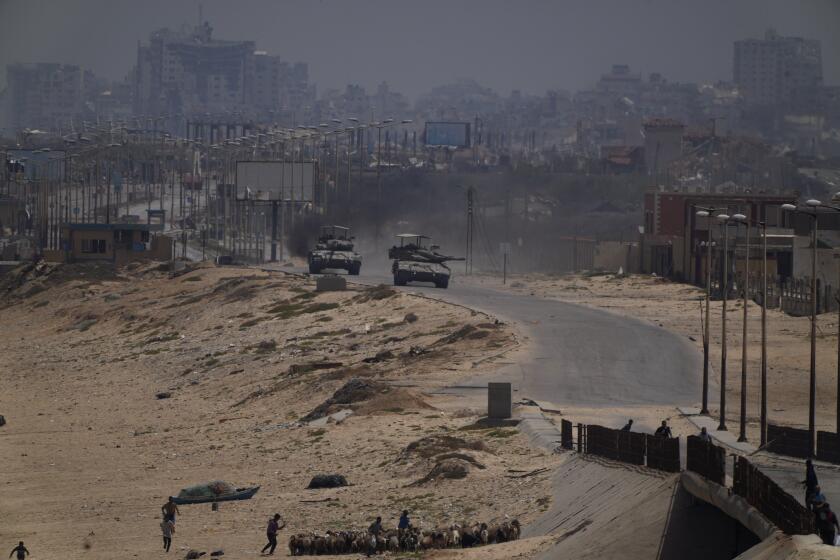U.S. Extradition Process Begins Against Sheik
Following a formal request by the Egyptian government, the United States on Sunday began extradition proceedings against Sheik Omar Abdul Rahman, the militant Muslim cleric whose followers have been linked to the World Trade Center bombing and an alleged plot to blow up the United Nations building.
Egyptian Foreign Minister Amir Moussa made the request Sunday afternoon in Cairo (about 4:20 a.m. PDT) during a meeting with U.S. Ambassador to Egypt Robert H. Pelletreau.
Acknowledging that the extradition process was under way, Secretary of State Warren Christopher said on a Sunday morning TV news program: “We will process the request in the normal way . . . and we will go about it in a prompt way. It’s a procedure, though, that could take some time.”
U.S. officials say the complex legal process could take years. Abdul Rahman has the right to make numerous appeals, both of the extradition and of the outcome of a U.S. deportation case against him.
His lawyer, Abdel Halim Mandour, has said the cleric does not wish to return to Egypt in the current climate of political tension and will seek to block extradition.
The 55-year-old blind cleric is already in custody in an Upstate New York federal prison, having surrendered to immigration officials Friday night after a 20-hour standoff at a Brooklyn mosque.
A Muslim activist in contact with the sheik told Reuters news service that Abdul Rahman is charging that he is being treated like a “common criminal at the facility.”
“He was stripped naked in front of everybody, which is forbidden by Islamic law. They took his clothes away, his medications,” said Ahmed Sattar.
Rex Sproul, a spokesman at the prison, denied that Abdul Rahman was being mistreated. He said the cleric was “doing fine and that there were no problems with him.”
The extradition request marks a significant turnaround for the Egyptian government, which had not previously sought to return Abdul Rahman to Egypt despite a case against him stemming from a 1989 riot near his hometown of El Faiyum, south of Cairo.
Abdul Rahman and others are accused of the attempted murder of two police officers and inciting violence in El Faiyum. Although he was acquitted on the charges once, the Egyptian government was dissatisfied with the outcome and ordered the case retried.
Many Egyptian officials have said they fear that the return of the popular cleric could spark new outbreaks of violence and demonstrations in the country, which already has seen more than 150 deaths in the past year in the conflict between Islamic militants and national security forces.
But on Saturday, a judge in the El Faiyum case ordered Abdul Rahman returned to face trial, thereby forcing diplomats to begin an extradition process that they probably would have preferred to avoid.
The decision to seek the extradition also reflects a degree of confidence on the part of Egyptian security officials that the hundreds of arrests of Islamic militants over the past several months have significantly impaired the militants’ ability to launch destabilizing actions against the government.
“They obviously feel that they can manage the matter within their own country and want to have him (Abdul Rahman) back for crimes that they feel he has committed,” Christopher said during an appearance on NBC-TV’s “Meet the Press.”
In Egypt, Nagui Ghatrify, a spokesman for the Egyptian Foreign Ministry, said that in the past the government “never had a preference whether he (Abdul Rahman) came or went.”
“But now we are facing a decision by the court, and the law has to prevail. It’s a legal matter. The court will reveal the facts and bring justice,” Ghatrify said.
The extradition treaty between the United States and Egypt dates to 1874 and was signed by the government of the Ottoman Empire. State Department spokesman Michael McCurry said it requires “a low threshold of review” by U.S. courts and provides that the Egyptian government must prove only that there is reason to believe that an offense was committed.
Abdul Rahman entered the United States from Sudan in 1990 on a visa that the United States now says should not have been issued, primarily because he was on a U.S. government list of undesirable foreigners.
He is also alleged to have lied on his immigration papers about a check-fraud conviction in Egypt and to have failed to disclose the fact that he has three wives. Either of those matters would have disqualified him for U.S. residency.
Last March, an immigration judge ordered him deported, and he is now appealing to the Board of Immigration Appeals in Washington. From there, he can take his case to a federal appeals court.
“He’s fighting this effort to deport him, and that’s a separate proceeding (from the extradition request). One does not cancel out the other,” one U.S. official said. “The United States can’t kick him out of the country while he has an appeal pending to stay here.”
While in this country, Abdul Rahman has been preaching at mosques in Brooklyn and Jersey City, N.J.
He has not been accused of any violent crime, but at least a dozen of his disciples have been arrested in connection with the Feb. 26 bombing of the World Trade Center, which killed six people and injured more than 1,000, and an alleged conspiracy to assassinate government officials and bomb several sites in New York.
Some Egyptian analysts said the decision by the United States to take Abdul Rahman into custody last week in the deportation case made it easier for Egypt to request extradition on its own criminal charges.
There is also a belief among many of these analysts that the cleric, whose fiery sermons distributed on underground cassette tapes have been a source of inspiration for young Muslims, might prove less appealing in person.
“From a distance, with the cassettes and acting like a martyr, he gets a lot of attention and a lot of sympathy. But in person, this is not so. In person, his shadow will be limited,” said former diplomat and political analyst Tahseen Bashir.
“If he comes back, then he’s either acquitted, and that will attest to the correctness of the Egyptian legal system, (or) he is sentenced . . . , then the Egyptian government can say that the legal system openly decided on the case. He can appeal it, and in both cases the big mythology of Omar Abdul Rahman will be reduced to concrete dimensions,” Bashir said.
Abdul Rahman’s attorney said the judge in the El Faiyum case had no authority to order Abdul Rahman’s appearance because of a pending request to change judges in the case.
Abdul Rahman, he said, “is not coming here for trial, but to be put under political and security pressures.”
Tumulty reported from Washington and Murphy reported from Cairo.
More to Read
Start your day right
Sign up for Essential California for news, features and recommendations from the L.A. Times and beyond in your inbox six days a week.
You may occasionally receive promotional content from the Los Angeles Times.






